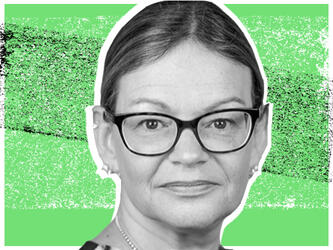Martin Sorrell talks integration, Google and good ideas
“Young people can win. That’s the reason why this industry is so vibrant”

Pointing to “the first generation that has lived with the internet since they came out of the womb” – and which is graduating now – Sorrell claimed: “When they get into power and control, we’ll see even more rapid adoption, even more internet start-ups. And I think we’ll see even more rapid change from the BRIC markets.”
“You’ve only as good as your last idea,” Sorrell warned. “The barriers to entry are pretty low. Young people can win. That’s the reason why this industry is so vibrant.”
“We need more skills in programming; we need more skills in data”

Sorrell urged the importance of what he termed ‘data and investment management’. He also outlined his key predictions for research and marketing services over the coming months and years.
“We need more skills in programming; we need more skills in data; we need more skills in digital,” he told delegates, “And by digital I mean search, display, mobile, video, and social.”
Describing Google as a ‘frenemy’ – he said that, “The powerhouse will continue to be Google – which is our 50th largest client worldwide.”
“People say online is measurable,” he added. “But we could make online, and offline, even more measurable. We haven’t achieved the holy grail.”
“Traditional newspapers and magazines are still under tremendous pressure,” he added “We spend roughly 20% there but people spend only 10% of their time there. These things do take time.”
“I think integration, horizontality, is the key”

Sorrell also took a swipe at the Public-Omnicom merger. He claimed that what differentiates his own group, WPP, is its ability to harness data. “POG [Publicis-Omnicom Group] talk about having a data business but it’s built on third-party data,” he said.
He warned, too, that the middle ground “will get eaten up”, with smaller independents continuing to thrive alongside the largest groups. “
“I think integration, horizontality, is the key,” he added. “Doing deals is easy. Paying money is easy. But the integration process is really important. Our businesses are inherently quite fragile. It always pays to keep them separate and to bring them slowly together – rather than destroying brands by slamming them together.”

We hope you enjoyed this article.
Research Live is published by MRS.
The Market Research Society (MRS) exists to promote and protect the research sector, showcasing how research delivers impact for businesses and government.
Members of MRS enjoy many benefits including tailoured policy guidance, discounts on training and conferences, and access to member-only content.
For example, there's an archive of winning case studies from over a decade of MRS Awards.
Find out more about the benefits of joining MRS here.











1 Comment
Sirtran
11 years ago
This man Sorrell talks about strategy, new ideas, youth and so on, but as far as I know his only business idea is to acquire, downsize and acquire again. Why does he profess expertise in these areas when his work is that of an accountant. There is no strategy beyond that antiquated holding company business model. And speaking of antiquated, Sorrell is many years past retirement but is the only person in WPP, a company of 120,000 people, that isn't forced to retire at 65. How are we still entertaining these CEOs and there enormous egos?
Like Reply Report